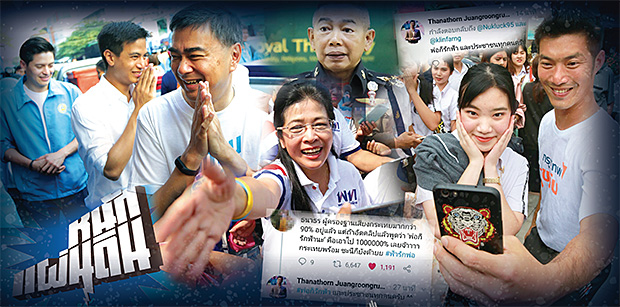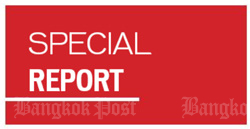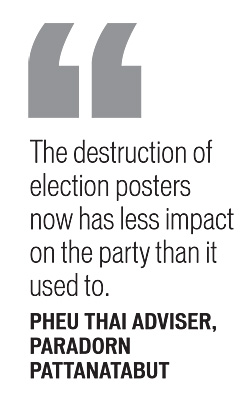Reflecting the fierce competition in the run-up to the March 24 election, political parties are already using creative and dirty tactics to win the MP seats. While campaign poster vandalism is still as prevalent as in every past election, online mudslinging now appears to be far fiercer -- a matter of concern to both parties and the election regulator.

Politicians are out on the streets to woo voters.
The stakes are high because social media is seen as the most effective channel to reach the 7-8 million first-time voters, accounting for more than 10% of the 50 million total eligible voters.

The Election Commission has admitted to finding it difficult to prevent new media from being abused as a tool to influence the decisions of a demographic of voters who are already highly active on social media in their daily life, especially by groups of political sympathisers who aren't in the country.
The main targets of these online attacks are key prime ministerial candidates.
Among the recent cases were the controversial nomination by the Thai Raksa Chart Party of Princess Ubolratana as its sole candidate for prime minister and criticism over a remark made by Future Forward Party leader Thanathorn Juangroongruangkit about the so-called Siamese smile.
Other instances include accusations made against each other by Democrat Party leader Abhisit Vejjajiva and Khunying Sudarat Keyuraphan, a prime ministerial candidate of the Pheu Thai Party. Mr Abhisit is the sole candidate for prime minister of the Democrat Party.
Even army chief Gen Apirat Kongsompong's outburst against proposed defence budget cuts by various parties was widely commented on and repeated online.
Jessada Salathong, a lecturer at the Faculty of Communication Arts at Chulalongkorn University, said he has been keenly observing the political communication wars on social media.
The Future Forward Party, which is targeting a new generation of first-time voters, has been a big target, he said adding that this party itself also uses social media to communicate with its support base.
Many references have been made to what the party leader Thanathorn had said on sensitive issues in the past. Then came content to counter the critical content, as well as new content to counter that defence. Many times this rhetorical back-and-forth was delivered in the form of infographics, or memes, Mr Jessada said.
"We don't know who they [the people behind the social media war] are, but we can see their political stance. Political parties are unlikely to do this by themselves as it would be too risky to violate election laws and regulations. The Computer Crime Act also counts," he said adding that Twitter is most frequently used platform as users are generally anonymous.

"The parties who call themselves the 'democratic camp' are better at using social media than the other parties," he said, adding that while the army chief talked about playing the song Nak Phandin via an internal broadcast network, his comments were spread wildly via social media with hashtags.
However, he gave an example of the Mettad Facebook page which recently launched a meme to counter Mr Thanathorn's remarks on the 1932 revolution, which changed the system from absolute monarchy to democracy.
"I'm not saying if I agree with the content or not as each side interprets history to benefit themselves, but this piece was well written, giving historical information and using satirical, modern language appropriate to a new generation," he said.
There are currently four types of coordinated social media use in the build-up to the March 24 election, according to Pitch Pongsawat, a political science lecturer with Chulalongkorn University.
These are being carried out by parties or election candidates, online news agencies, influencers and various groups carrying out information operations (IO), he said.
Influencers are dangerous because while they use social media to discredit their opponents in a savvy way such as through memes and multimedia, their agendas aren't directly regulated by the law, he said.
As for the IO group, they often use fake news to discredit someone, he said, adding that is was usually difficult to target the origin of this type of propaganda.
For Apisit Supakitcharoen, a lecturer with Faculty of Mass Communication of Ramkhamhaeng University, "Any attempt to control those influencers may risk provoking a new problem of freedom of expression violations. But if they are totally free to say what they want, the question is who will be able to guarantee the public is given balanced information".
Each party is fighting hard to win the hearts of first-time voters, in the belief that if it can get them this time, they will continue to receive their support in future polls.
Hashtag creation is another key element in the parties' race to grab young voters' attention and support, he said, adding that popularity on social media also brings a chance of making it onto more mainstream media channels.
Mr Apisit said he doesn't really regard it as a dark side of the election campaign even if it involves negative comments against any particular party or candidate.
It is more important to promote the idea of "media literacy" among voters to help them decide what to believe, he said.
The mainstream media and the election regulator should play a leading a role in this movement, he said.
Assoc Prof Gothom Arya, director of the Research Centre for Peace Building, Mahidol University, argues the Election Commission (EC), the Digital Economy and Society Ministry and the National Broadcasting and Telecommunications Commission are responsible for taking legal action to curb these attempts to provoke more conflicts and violence on the social media.
However, since the royal decree announcing the general election on Jan 23, the EC has taken action in only a few cases, in which it sought to have social media posts deemed vulgar, violent or provocative deleted.
The EC last week resolved to have four to five such posts deleted while it works on more than 20 other cases of alleged defamation and violation of the computer crime law, said Chanin Noilek, director of the EC's legal and litigation office.
The EC has a specific team handling online defamation associated with the March 24 poll, he said.
The EC is now working together with the operators of popular social media platforms and can immediately seek the deletion of any posts deemed a serious violation of the election law, he said.
"To mitigate a negative impact on an affected party in terms of popularity among voters, the EC will immediately seek to have a defaming social media post deleted without having to wait for anyone to lodge a complaint about it," he said.
"Social media users should think twice before tapping the 'Like' button or sharing such a post as they may end up facing one-third of the punishment for posting something that violates the election law."
Secret conversations in a closed Line chat group, for instance, can still cause a problem if a screenshot of the conversations is leaked, he said.
The entire chat group may end up facing legal action, he said.
The media should also be warned to never repeat the misconduct by publishing a picture or a message regarded as a violation of election law, he said.
Paradorn Pattanatabut, former secretary-general of the National Security Council who is now a Pheu Thai adviser, said the party is now more worried about mudslinging on social media than the vandalisation of election posters.
"The destruction of election posters now has less impact on the party than it used to be before the era of social media, while social media attacks tend to have a greater impact for a very low cost," he said.
The Democrat Party has not formed any formal team to deal with online defamation against it, but it remains vigilant, said party deputy leader Nipit Intarasombat.
"The party has a policy to deal with fake news by promptly explaining and providing correct information to voters," he said.
"This isn't a friendly atmosphere for an election. And although it's the government's responsibility to deal with the problem, don't get your hopes up as the government itself is now part of the race."
Nikorn Chamnong, director of the Chartthaipattana Party, described the election campaign period as a situation in which everyone is ready to launch an attack on an opponent if the opportunity arises.
Despite saying the party isn't worried about online slurs, Mr Nikorn admitted that the party nevertheless has a special team in place to monitor the situation.
"The problem appears to be more hostile on social media, which is very new to the party," he said.
Bhumjaithai Party registrar Supachai Jaisamut, meanwhile, viewed the situation as the same old political tactics, in which each side tries to discredit its opponents, albeit in a new format.
The party is more concerned about abuses of state power by a certain party linked to the current government to manipulate the election, said Mr Supachai.
Influential figures and government offices in the provinces were being asked or paid to help that particular party win support from voters, he said, adding that this is far more of a concern to the party.
Sometimes, as many as 30 election posters had gone missing from where they were installed all at once and all the party could do in response to such an incident was file a complaint with the police and wait for a response, he said.
That happened in an area that is a political stronghold of a local influential figure, he said.
He blamed the EC for failing to work proactively in deterring these common problems in the election.